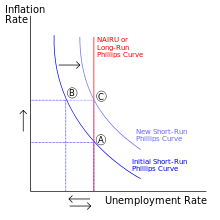Pluralism in economics
| Economics |
|---|
 Phillips curve graph, illustrating an economic principle |
|
|
| By application |
|
| Lists |
|
The pluralism in economics movement is a campaign to 'enrich teaching and research and reinvigorate the discipline... [and bring] economics back into the service of society'.[1] Dalen writes that economics had greater scientific pluralism in the past[2] compared to the monist approach that is prevalent today.[3][4] Pluralism encourages the inclusion of a wide variety of neoclassical and heterodox economic theories - including classical, Post-Keynesian, institutional, ecological, evolutionary economics, feminist, Marxist and Austrian, stating that "each tradition of thought adds something unique and valuable to economic scholarship."[5]
The movement for pluralism can be traced to wider movements for progressive change in the 1960s and 1970s, with economists like Frank Stilwell and Steve Keen campaigning for pluralist and critical economics teaching at the University of Sydney in 1971.[6] In 1992, a petition organised by Geoffrey Hodgson, Uskali Mäki and Deirdre McCloskey[7] was published as a paid advertisement in the American Economic Review. This petition described itself as a "plea for a pluralistic and rigorous economics" [8] and was preceded by a commission of the American Economics Association, called ‘Report by the Commission on Graduate Education’. [9] Many critics of mainstream economics began to describe themselves as proponents of pluralism; they formed groups or organizations such as The International Confederation of Associations for Reform in Economics (ICARE).[10] Later, French students announced a "post-autistic economics" movement; [11] a "rebellion" of students at the École Normale Supérieure happened in 2000; [12] Cambridge University students organised a petition in 2001, and in 2011 the Cambridge Society for Economic Pluralism was formed, promoting pluralist thinking and pushing for curriculum reform within the university; [13] FEED organised a plea in 2009 with over 2,000 signatures in the first month; [14] In 2011 Harvard students organized a walkout from their Economic Principles class thereby objecting to the one-sided presentations of their professor Gregory Mankiw.[15] Paul Krugman and Richard Layard organised a 'Manifesto For Economic Sense' in 2012; [16] Post-Crash Economics Society Manchester published a petition in November 2013; [17] UK student groups published a draft manifesto in April 2014; [18] and at Manchester in April 2014, the economics department rejected a course devised by the Post-Crash Economics Society called 'Bubbles, Panics and Crashes: an Introduction to Alternative Theories of Crisis'.[19] On May 5th 2014, economics students from 19 countries published an 'international student letter' [1] and formed ISIPE, calling for 'a pluralism of theories and methods' so that economics students 'understand the broader social impacts and moral implications of economic decisions'. [20]
Some critics of mainstream economics have called for "reform" in the past. For example, ICAPE was originally ICARE but replaced the R ("reform") with P ("pluralism") stating that "'reform' ... does not properly characterize the nature or purpose of our organization..."[10]
See also
- Foundation for European Economic Development
- ISIPE
- Cambridge Society for Economic Pluralism
References
- 1 2 ISIPE (2014-05-05). "International Student Letter". ISIPE. Retrieved 2014-05-07.
- ↑ Hendrik P. Dalen (2003-05-11). "Pluralism in Economics: A Public Good or a Public Bad?". 03-034/1. Tinbergen Institute Discussion Papers.
- ↑ "Policy Implications of Post-Autistic Economics". Post-Autistic Economics Network. 2006-10-09. Retrieved 2007-05-25.
- ↑ Peter, Monaghan (2003-01-24). "Taking On 'Rational Man'". The Chronicle of Higher Education. Retrieved 2007-05-25.
- ↑ "ICAPE home". International Confederation of Associations for Pluralism in Economics. Retrieved 2007-05-25.
- ↑ Butler, Gavan; Jones, Evan; Stilwell, Frank (2009). Political Economy Now! The struggle for alternative economics at the University of Sydney.
- ↑ FEED. "The 1992 Plea for a Pluralistic and Rigorous Economics".
- ↑ "A Plea for a Pluralistic and Rigorous Economics", American Economic Review, 82(2): xxv.
- ↑ Krueger, A.O. Arrow, K.J. et al (1991). "Report of the commission on graduate education in economics", Journal of Economic Literature, 29(3): 1035-1053.
- 1 2 "ICAPE - History". International Confederation of Associations for Pluralism in Economics. Retrieved 2007-05-25.
- ↑ Fullbrook, Edward (2003). The Crisis in Economics: The post - autistic economics movement: the first 600 days. Routledge. ISBN 978-0415308984.
- ↑ Hayes, Christopher (2007-06-11). "The Hip Heterodoxy". The Nation.
- ↑ The Cambridge 27. "Opening Up Economics". Post-autistic Economics Newsletter. Retrieved 2014-04-29.
- ↑ FEED. "Mistaking Mathematical Beauty for Economic Truth". FEED. Retrieved 2014-04-30.
- ↑ http://www.huffingtonpost.com/john-komlos/need-for-a-paradigm-switc_1_b_5482680.html
- ↑ Safdar, Khadeeja (2012-06-28). "Paul Krugman Asks Economists To Sign 'Manifesto For Economic Sense'". Huffington Post. Retrieved 2014-04-30.
- ↑ Post-Crash Economics Society Manchester. "Revise the University of Manchester's Economic Syllabus". Post-Crash Economics Society Manchester. Retrieved 2014-04-29.
- ↑ Rethinking Economics. "Draft Manifesto: A direction for the reform of economics education". Rethinking Economics. Retrieved 2014-04-29.
- ↑ Jones, Claire. "Students' hopes dashed over 'crash' course in economics teaching". Financial Times. Retrieved 2014-04-29.
- ↑ Claire Jones (2014-05-05). "Economics students of the world, unite!". Financial Times Money Supply Blog. Retrieved 2014-05-07.
External links
- The International Confederation of Associations for Pluralism in Economics
- The Association for Heterodox Economics
- The Post-autistic Economics Network
- The Association for Integrity and Responsible Leadership in Economics and Associated Professions
- World Economics Association